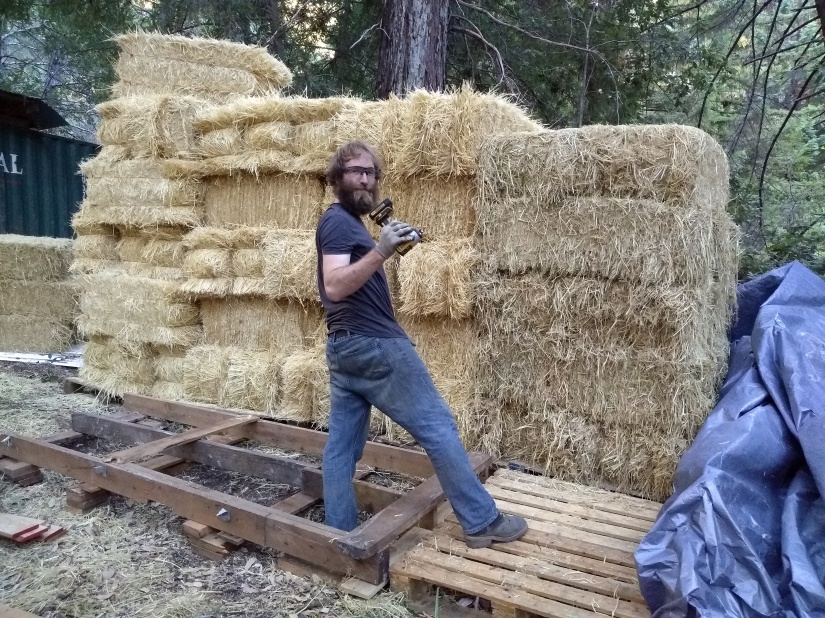Our mushrooms really speak for themselves, but if you want the story, here it is!

We operate a small scale organic mushroom farm. When we first started out we were producing about 30-50 pounds of oyster mushrooms a week. Currently we grow over a 100 pounds of fresh, gourmet oyster mushrooms which we sell in area farmers’ markets, local restaurants and grocery stores and through the MendoLake Food Hub, a non-profit local food distribution center.
In order to grow our mushrooms year round and provide a high quality product, we use 2 custom fitted, re-purposed shipping containers. This allows us to provide the right growing parameters for the mushrooms which include moisture, ventilation, lighting and a pest-free environment. In less than 600 square feet of space, we are able to provide several thousand pounds of high-protein, nutrient-dense food per year to our community!

Oyster mushroom production is unique in that it can exclusively rely on agricultural waste streams, for example: wheat straw, rice straw, wood chips, coffee grinds, spent brewer’s mash, etc. These mushrooms are incredibly efficient organisms with a bio-efficiency of 100%, which means that each pound of straw can produce a pound of fresh mushrooms. We always use organically produced straw. When possible, we source our straw from local farmers using organic practices (our most recent load was from Doug Mosel at The Mendocino Grain Project).

Oyster mushrooms do not require fertilizers, pesticides or herbicides and use very little water compared to meat or vegetable production. The water we use inside our mushroom house is recycled for use in an outdoor mushroom bed, which has created a haven for insects and birds. We have plans to plant native flora in this area as well. Our production facility uses a very small footprint on the land. As mentioned above, we can produce high volumes of food in a very small space with incredibly low energy usage.
All of our spent substrate (what is left after the mycelium eats the straw and produces mushrooms) gets turned into high quality fungal-dominant compost. We implement the Johnson-Su Bio-reactor method of compost creation.

Benefits of Johnson-Su Bioreactor Compost:
- Increases soil carbon sequestration
- Increases crop yield
- Increases soil nutrient availability
- Increases soil water-retention capacity
- Produces biologically diverse compost
- Produces nutrient–rich compost
- Results in a low-salinity compost
- Improves seed germination and growth rates
We also plan on establishing myco-remediation as a part of our business model. Potential options would include: inoculation of stumps at timber harvest sites, soil and waterway clean-up of heavy metals and petrochemicals, and establishing outdoor growing areas of specific polypore mushrooms that have been show to improve native and honey bee health. Stay tuned-in to our blog posts and Instagram @Forest_People_Mushrooms for more on these actions.
Here’s a great article describing oyster mushrooms and all their amazing benefits, written by Paul Stamets: https://www.huffpost.com/entry/oyster-mushroom_b_2522084
Also an important note on eating mushrooms (re-posted from FungiPerfecti.com):
Should You Consume Raw Mushrooms?
With the increased use of mushroom products, I feel a personal responsibility to inform the public about safety issues regarding mushroom preparations. Misleading marketing causes consumer confusion, risk, and damage to our industry, which is always under scrutiny. At Host Defense we are dedicated to providing the best, evidence-based, scientific information concerning safety and optimum use of mushrooms for health benefits.
Should you consume raw mushrooms and/or mushroom mycelium?
- No, absolutely not! Raw mushrooms are largely indigestible because of their tough cell walls, mainly composed of chitin.
- Dr. Andrew Weil advises, in agreement with other experts, that mushrooms must be cooked! “Mushrooms have very tough cell walls and are essentially indigestible if you don’t cook them. Thoroughly heating them releases the nutrients they contain, including protein, B vitamins, and minerals, as well as a wide range of novel compounds not found in other foods,” (Prevention, Feb 1, 2013).
- Raw mushrooms and raw mycelium may pose health hazards from harmful pathogens and heat-sensitive toxins—potentially causing red blood cell damage1, gastrointestinal irritation and allergic reactions, such as skin rashes2.
How can one safely use mushrooms?
- By consuming mushrooms or mushroom products that have been cooked, or heat-treated.*
- Proper heat treatment denatures toxins, softens fungal tissues, and allows our natural digestive enzymes to access and utilize the inherent benefits of both culinary mushrooms and mushroom supplements: Edible mushrooms should be tenderized by heating to at least 140 ˚F —over many hours— more preferably over 180˚F, most preferably above 200 ˚F to release their nutrients and render them digestible and safe.3

